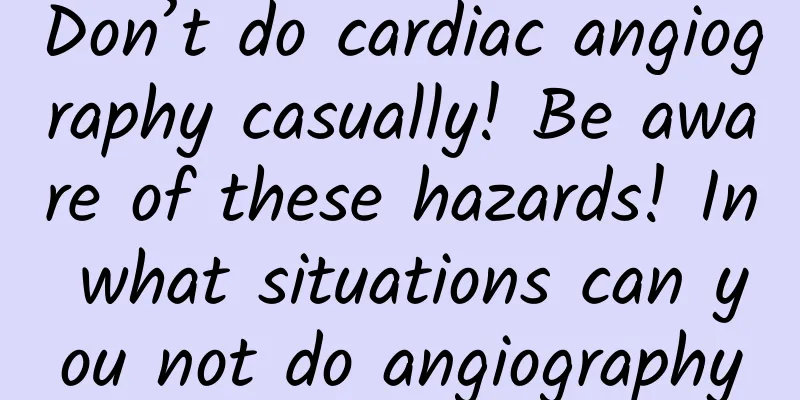Don’t do cardiac angiography casually! Be aware of these hazards! In what situations can you not do angiography

|
A patient complained to his doctor: "The heart stent surgery that was originally scheduled was postponed for a week because of the fever! What's the reason? Is it necessary?" This is a 60-year-old lady who was hospitalized because of repeated angina pectoris after activities. Coronary CTA showed severe stenosis of multiple blood vessels. The doctor recommended cardiac angiography and stent implantation if necessary. After admission, all preparations were in place and she was waiting for surgery. However, the flu was prevalent in recent days. The patient was "infected" the night before the surgery, with a body temperature of up to 38.5℃! Although symptomatic treatment was given, she still had a high fever the next day. The doctor asked to postpone the surgery, but the patient was very confused: "Is there any connection between influenza and angiography? Why can't we do it?" The doctor explained: Cardiac angiography cannot be done casually, otherwise it will cause new harm! Be careful when doing angiography in the following situations: 1. Cardiorenal insufficiency Contrast agents are used for cardiovascular imaging during surgery. When large amounts of these contrast agents enter the human body in a short period of time, they will increase the burden on the heart, aggravate the condition of patients with heart failure, and even induce acute heart failure! In addition, contrast agents have certain renal toxicity. Patients with renal insufficiency may have difficulty in excreting contrast agents, which may stay in the kidneys for too long, aggravating renal insufficiency. Although most renal damage is transient and reversible, severe cases may cause persistent renal failure and even require dialysis treatment. 2. Infection and Fever Although cardiac angiography is minimally invasive, it still involves surgical trauma, which may aggravate the inflammatory response and worsen the infection and fever. More importantly, angiography exposes the body to radiation, which may inhibit cell division and proliferation, reduce immune function, and further aggravate cold symptoms, making it difficult to recover. 3. Contrast agent allergy and hyperthyroidism Contrast agents are synthetic iodine. Cardiac angiography is not recommended for patients who are allergic to iodine. In severe cases, it may even cause anaphylactic shock and endanger life. In addition, the iodine in the contrast agent will aggravate hyperthyroidism, so patients with uncontrolled hyperthyroidism cannot undergo cardiac angiography. 4. High risk of bleeding Heparin is used for anticoagulation during cardiac angiography, and if a stent is implanted, aspirin and other antiplatelet drugs are also taken for a long time. These are all high-intensity "blood-activating drugs." If the patient has combined trauma, cerebrovascular or gastrointestinal bleeding, and other coagulation disorders, there is a risk of worsening bleeding. I am Dr. Zhang from the Department of Cardiology. If you like my popular science articles, please like them! You can also share them with friends in need! Follow me to see more health knowledge about heart disease! |
<<: Does myopia surgery have a “shelf life”?
>>: It’s getting colder, so why are there more people suffering from “anger”?
Recommend
What is the reason for the pain in the lower left side of the girl's abdomen
In life, many women will have some gynecological ...
33 weeks pregnant, my belly is hard every day
Pregnancy for ten months is a very difficult proc...
Abdominal pain started four or five days after abortion
When a woman has an unexpected pregnancy and is n...
How to wean breastfeeding women
As we all know, pregnant women start breastfeedin...
Strong vaginal odor
If the female genitals are not cleaned in time, i...
What are the breast enhancement massage methods while lying in bed?
In daily life, breast enhancement has always been...
What are the benefits of drinking bayberry juice for pregnant women? What should I pay attention to when drinking bayberry juice?
Bayberry juice is rich in vitamin C and can promo...
Will milk still increase after supply and demand are balanced?
For mothers who have just given birth, breastfeed...
What is the best thing to eat after childbirth?
For Chinese people, confinement is very important...
How to replenish the body after induced abortion
After 12 weeks of pregnancy, if the pregnancy has...
Homemade healthy sweet soup in summer
As the weather is getting hotter, cooling off has...
Chinese medicine prescription for treating ovarian cysts
Ovarian cyst is one of the common diseases in wom...
I vomited yellow bile during pregnancy.
Almost every pregnant woman will experience nause...
Is it good to not wear a bra for a long time?
Breasts are the manifestation of female charm. In...









